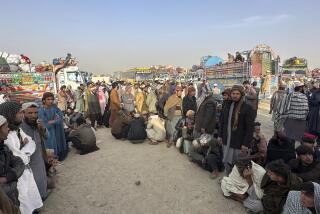Pakistanis release 8 Afghan Taliban prisoners
ISLAMABAD, Pakistan -- Pakistan has released another batch of Afghan Taliban prisoners, the Foreign Ministry announced Monday, a further sign of the Pakistani government’s willingness to facilitate efforts by Washington and Kabul to negotiate a peace agreement with the insurgents.
The ministry said eight Afghan Taliban detainees were released, including former Afghan Justice Minister Nooruddin Turabi and Abdul Bari, a former governor of Helmand province in southern Afghanistan, which has long been a stronghold for the Taliban insurgency.
Turabi reportedly became a Taliban insurgent commander in 2009 and has served as a deputy to the insurgency’s top leader, Mullah Mohammed Omar.
In November, Pakistan released 18 Afghan Taliban detainees at the request of Afghan President Hamid Karzai’s top peace negotiator, Salahuddin Rabbani.
Pakistan is widely viewed as crucial to efforts to broker a peaceful end to the conflict in Afghanistan, now in its 12th year. Pakistani officials have longstanding ties with Afghan Taliban leaders dating back to the Soviet occupation of Afghanistan.
Many experts believe Pakistan continues to support Afghan insurgents -- possibly to counter ties between Pakistan’s chief rival, India, and Afghanistan -- though in recent months they say Islamabad’s willingness to cooperate in Taliban reconciliation efforts has been encouraging. The U.S. is preparing to pull most of its troops out of Afghanistan by the end of 2014.
Other detainees released on Monday included the Taliban’s former Kabul governor, Mullah Daud Jan, and Allah Daad Tabib, another former government minister.
Not included in the latest release was the Afghan Taliban’s second-in-command, Mullah Baradar, who was captured by Pakistani forces in Karachi in 2010. Some analysts have contended that Pakistan captured Baradar because they knew he was holding secret talks with Karzai and, angered that it was left out of the negotiations, wanted to stymie the Afghan leader’s efforts.
ALSO:
Afghans to take over greater security role
Japanese leader wants to revisit apology for wartime suffering
African Union tells Central African Republic rebels to end uprising
More to Read
Sign up for Essential California
The most important California stories and recommendations in your inbox every morning.
You may occasionally receive promotional content from the Los Angeles Times.









